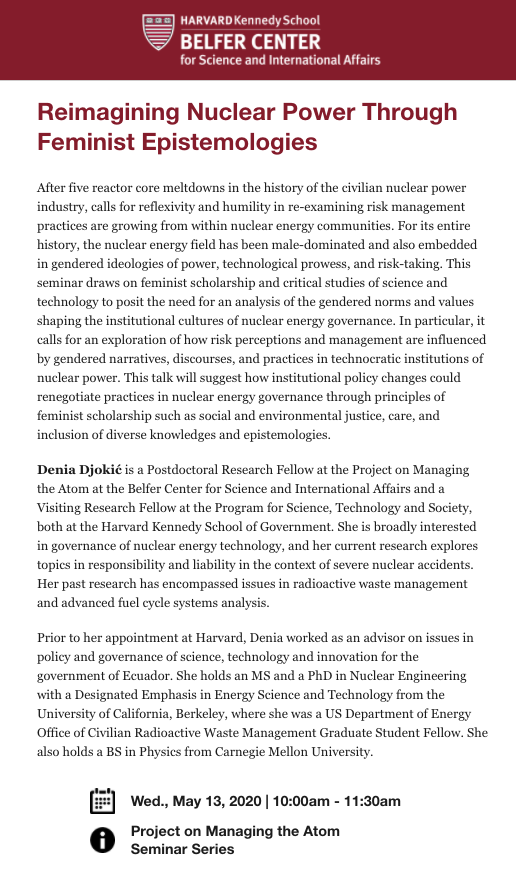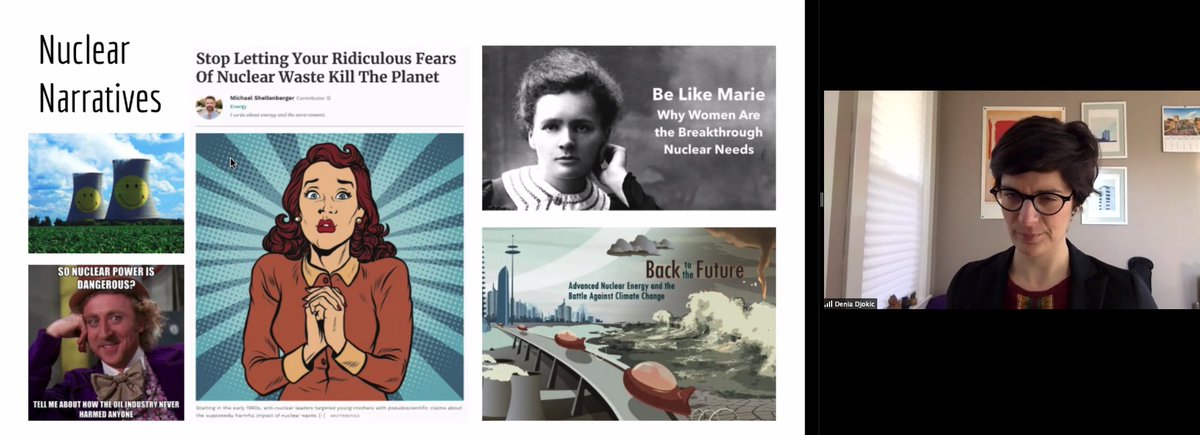Dr. Denia Djokic @deniadjokic at the @BelferCenter
is beginning her seminar "Reimagining Nuclear Power Through Feminist Epistemologies". It& #39;s being recorded by the organizers. I& #39;ll do some live-tweeting about it in this thread.
#feminism #WomenInSTEM #WomenInNuclear
is beginning her seminar "Reimagining Nuclear Power Through Feminist Epistemologies". It& #39;s being recorded by the organizers. I& #39;ll do some live-tweeting about it in this thread.
#feminism #WomenInSTEM #WomenInNuclear
She begins with a contrast between the anti-nuclear sentiment of the 70s/80s with the short-lived nuclear renaissance in the first decade of the 2000s .
She saw herself as part of a new generation (or more precisely perhaps, a growth spurt) in the nuclear engineering community willing to re-evaluate of risk and technical hubris in the field.
She calls upon Kant, Hume, and other ways of knowing associated with epistemic humility. In her work, she partly will begin to connect this re-evaluation of risk, safety, and responsibility with the current call for re-evaluation of gender equity in nuclear institutions.
With feminist scholarship, one can illuminate the notion that dynamics of power within institutions of nuclear technology governance have originated in a closed, secretive environment which can be problematic.
Perhaps: feminist scholarship can potentially help us to understand these power dynamics, the importance of diverse viewpoints in notions of risk, and the relationship of nuclear technology decisions with the public, womens voices, and the makeup of decision-makers.
Denia then endearingly introduces herself as a & #39;nuclear-STS boundary object& #39; and sneaks in a picture of her lovely mom and super cool brother.
(STS=Science and Technology Studies)
(STS=Science and Technology Studies)
She asks (paraphrased):
- What epistemologies have driven the culture of NE?
- How has the culture and narratives driven decision-making?
- How can we learn and change?
- What epistemologies have driven the culture of NE?
- How has the culture and narratives driven decision-making?
- How can we learn and change?
She& #39;s astutely defined this community (a.k.a. #NuclearTwitter?) as the nuclear academic-industrial-laboratory-policy complex...
This is the complex of institutions that she is studying, epistemically.
This is the complex of institutions that she is studying, epistemically.
And now we& #39;re on the second-best slide so far ...
(Denia, I hope you don& #39;t mind the screen-shot. I& #39;ll take it down if you prefer not to be pictured.)
(Denia, I hope you don& #39;t mind the screen-shot. I& #39;ll take it down if you prefer not to be pictured.)
Next, she shares her observation of a growing call for humility in nuclear energy. Denia highlights some hopeful tidbits such as statements from EDF and a great article from @ToddAllen5 & @gregnemet: https://medium.com/third-way/energy-technology-exuberance-how-a-little-humility-is-good-for-nuclear-renewables-and-society-f6c9ec821b2c">https://medium.com/third-way...
An inspiration for this article and call for humility in general is the notion of Technologies of Humility from Sheila Jasanoff. Dr. Djokic recommends we all read the article: https://www.nature.com/articles/450033a">https://www.nature.com/articles/...
She highlights past efforts related to feminism and nuclear policy, but reflects that a great deal of this work is focused on nuclear security and nonproliferation policy. (e.g. https://outrider.org/nuclear-weapons/articles/what-does-feminism-have-do-nuclear-policy/)">https://outrider.org/nuclear-w...
When it comes to nuclear power (as distinct from nuclear security) analysis frequently focuses on the demographic variation in personal views on nuclear power. Denia is more interested today in the broader institutional view (institutional culture, notions of risk, decisions..)
A particular piece of interest to Denia has been this article regarding the Challenger from Diane Vaughan: https://www.jstor.org/stable/24047877?seq=1">https://www.jstor.org/stable/24...
Denia then introduces us collectively to the notion of "Ethics of Care" which is a framework with a theoretical basis in moral philosophy and brought into feminist scholarship by Carol Gilligan and Joan Tronto.
It emphasizes the ethical foundation in relationships between humans, how we treat individuals requiring care, and much more.
She also introduces Standpoint Theories (including how knowledge reflects the perspectives of the knower and the need to represent the world in relation to the realities of non-dominant social groups).
The relationship between care and standpoint theory are illuminated by this quote that Denia shares with us:
"... knowing and thinking are inconceivable without the multitude of relations that make possible the worlds we think with" (Puig de la Bellasca, 2017)
"... knowing and thinking are inconceivable without the multitude of relations that make possible the worlds we think with" (Puig de la Bellasca, 2017)
Case Study 1: Fukushima Daiichi.
Denia highlights:
- It was a humbling moment.
- It was also a litmus test for the trust we place in institutions to handle disasters.
- And, interactions between human, organizational, and technical factors impacted safety.
Denia highlights:
- It was a humbling moment.
- It was also a litmus test for the trust we place in institutions to handle disasters.
- And, interactions between human, organizational, and technical factors impacted safety.
Case Study 2: The Yucca Mountain Repository
Denia highlights:
- US approach had no vocabulary for consent-based siting.
- More participatory processes in siting nuclear SNF repositories have succeeded internationally (see: Sweden, Finland).
- Can we learn?
Denia highlights:
- US approach had no vocabulary for consent-based siting.
- More participatory processes in siting nuclear SNF repositories have succeeded internationally (see: Sweden, Finland).
- Can we learn?
So, she comes to the main question: Now that we can learn, how could we change? (my words, not hers... she& #39;s more eloquent.)
In this, she has introduced a phrase that I& #39;ve never heard: "Gender mainstreaming." I should probably google it.
In this, she has introduced a phrase that I& #39;ve never heard: "Gender mainstreaming." I should probably google it.
She notes, however, that we can& #39;t just copy-paste solutions from other industries (because, kindly stated, these efforts may not be able to deconstruct entrenched culture in institutions, particularly notions of objectivity and rationality.)
And, purely focusing on "diversifying" our institutions isn& #39;t enough to really shift institutions, challenge social consciousness, reframe narratives, and incorporate care as a guiding principle in our decisions.

 Read on Twitter
Read on Twitter





